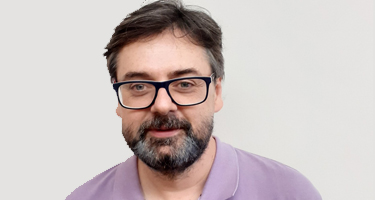Past Event: Oden Institute Seminar
Maciej Paszyński, Professor, Computer Science, AGH University, Krakow, Poland
3:30 – 5PM
Thursday Jul 28, 2022
POB 6.304 & Zoom
In this talk, we propose a linear computational cost simulator for time-dependent Maxwell equations. We employ the higher-order and continuity basis functions as considered in the isogeometric analysis (IGA). We focus on non-stationary Maxwell equations defined on a regular patch of elements. We employ the idea of variational splitting and introduce a second-order accurate time-integration scheme for the time-dependent Maxwell equations in a weak form. Our matrix of the system of linear equations resulting from the discretization of the Maxwell equations preserves a Kronecker Product structure. It enables linear computational cost factorization.
Additionally, we derive a formulation of the absorbing boundary conditions (ABC) suitable for direction splitting. We verify our linear computational cost solver on the manufactured solution problem. We illustrate our solver on several numerical problems. To verify the ABC, we perform numerical simulations of the Scattering problem (traveling pulse wave). We simulate the propagation of EM waves from the dipole antenna. We also perform the simulation of the magnetotelluric problem, illustrating the wave generated by the ionosphere, propagating through the formation layers. The variational splitting non-stationary Maxwell code has been implemented in our shared memory parallel IGA-ADS code [1], following a collection of stabilized linear solvers for advection-dominated diffusion [2] and Navier-Stokes problems [3]. The parallelization is supported by the GALOIS library [4]. We illustrate the parallel code with the shared-memory scalability tests of our non-stationary Maxwell simulations.
[1] Marcin Łoś, Maciej Woźniak, Maciej Paszyński, Andrew Lenharth, Muhamm Amber-Hassaan, KeshavPingali, IGA-ADS: Isogeometric analysis FEM using ADS solver, Computer Physics Communications, vol. 217, pp.99-116, 2017.
[2] Marcin Łoś, Ignacio Muga, Judit Muñoz-Matute, Maciej Paszyński, Isogeometric Residual Minimization Method (iGRM) with direction splitting for non-stationary advection–diffusion problems, Computers & Mathematics with Applications, vol. 79, no. 2, pp. 213-229, 2020.
3] Marcin Łoś, Ignacio Muga, Judit Muñoz-Matute, Maciej Paszyński, Isogeometric residual minimization (iGRM) for non-stationary Stokes and Navier–Stokes problems, Computers & Mathematics with Applications, vol. 95, no. 1, pp. 200-214, 2021.
[4] Vishwesh Jatala, Roshan Dathathri, Gurbinder Gill, Loc Hoang, V. Krishna Nandivada, and Keshav Pingali, A Study of Graph Analytics for Massive Datasets on Distributed GPUs. In International Parallel and Distributed Processing Symposium (IPDPS), 2020 https://iss.oden.utexas.edu/?p=projects/galois
Maciej Paszyński is a professor of computer science. He received his Ph.D. (2003) in mathematics with applications to computer science from the Jagiellonian University, Krakow, Poland, and a abilitation (2010) in computer science from the AGH University of Science and Technology, Kraków, Poland. In 2003–2005, he worked as a postdoctoral fellow at Oden Institute (previously ICES) at UT, Austin. Since 2006 he has been a frequent visitor at Oden Institute, at Basque Center for Applied Mathematics (BCAM), King Abdullah University of Science and Technology, Pontifical Catholic University of Valparaiso, Chile, and Curtin University, Western Australia. He is an Editor of the Journal of Computational Science and the Thematic Track Chair of the International Conference on Computational Science. With his research group a2s.agh.edu.pl he performs research oriented towards the applications of artificial intelligence (AI) and high-performance computing (HPC) in advanced simulations.
